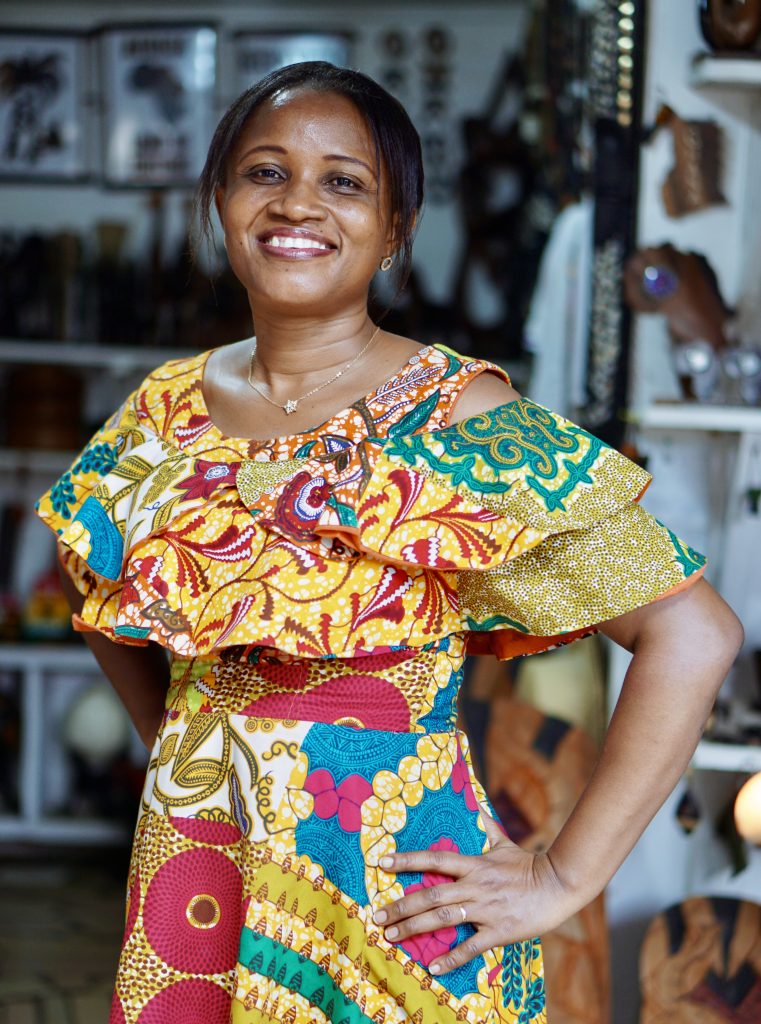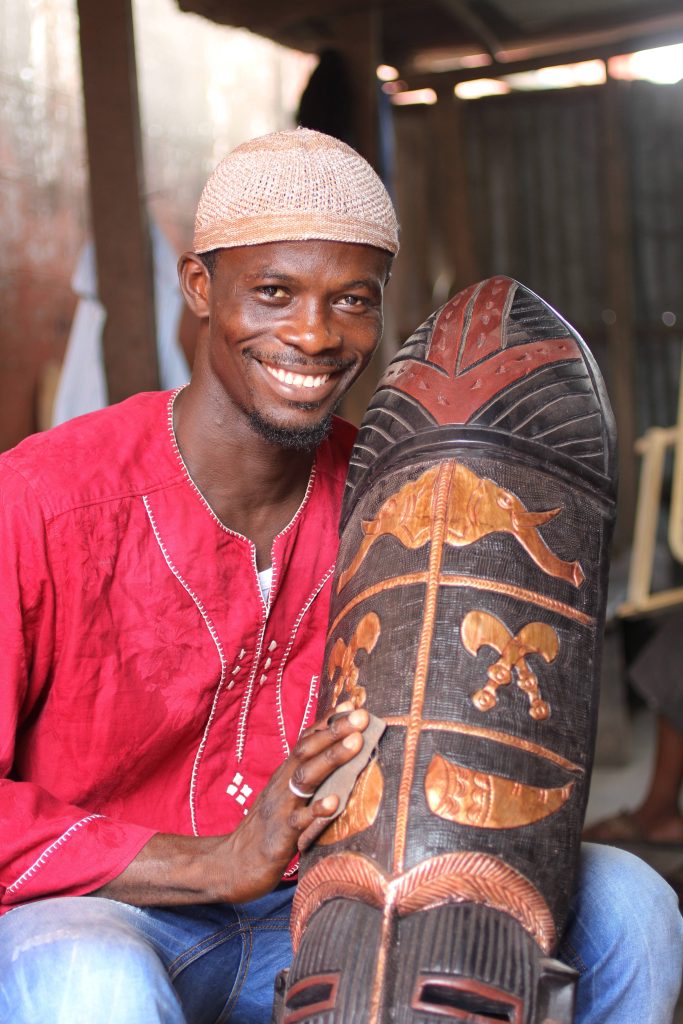
In a recent interview with Elizabeth Attoh, the country manager at Novica’s Artisan Empowerment Hub in Ghana, West Africa, she shared her thoughts on the impact of Novica on local artisans.
Q: From your viewpoint, how does Novica impact artisans?
A: Novica gives hope to artisans – gives artisans a reason to dream again, and a reason to express their creativity. Novica typically makes providing for their families possible. Novica’s impact continues to grow – with so many more lives remaining to touch. I am very proud to be a part of this great mission. The depth of our impact ignites me.
Recently it dawned on me that Novica artisans do not have to think of retiring. For as long as they are strong, they can still create – until they pass on. Even then, through their art, they continue to live on in the homes of customers. Their names will remain known.
Q: What is your long-term goal as a Novica representative in West Africa?
A: To bridge the gap between the bestsellers and the low sellers. To guide artisans to combine their passion for their craft with excellent business principles. And also for artisans to develop succession plans – for the good of their own small businesses, and likewise because by mentoring others they help keep cultural traditions alive.
Q: What is it like to witness — firsthand — artisans’ lives improving as a result of your work?
A: It feels great to positively impact the lives of artisans. Our help is transgenerational. When we assist an artisan, this one artisan influences the lives of their children (future leaders), their parents (older generations), and their community. My work, and that of our entire Novica team, is a huge factor in bringing hope to dying art forms.

Q: Tell us about the Novica team in Ghana.
Our team’s mission is to spread Love, and our goal is to put a smile on the faces of both artisans and customers. Our dream is to transform lives through service. Serving people is the most valuable aspect of life. We simply love what we do.
To achieve this, we have come up with our team’s values. This gives us a common focus to achieve a common goal. We are working together to live out these values which are NIEOTA, which stands for: N-Novica. I-Integrity, E-Empowerment, O-Ownership, T-Teamwork, A-Accountability.
Being a part of the mission of Novica gives us a platform to live out our dream. This makes our work with West African artisans very important, as a core desire is met. This love makes us always think of what’s next to do beyond what has already been done.
Q: Does one particular artisan story come to mind that inspires your daily work?
A: Abdul Aziz Mohamadu’s story inspires me a lot. I remember when he first walked into the Novica office with a few products a decade ago. His sales were so small. I had joined Novica not too long before, but already understood that an artisan’s consistent replenishment of products was crucial to their success on the Novica platform. I decided to work with Aziz on a project to learn the real impact of replenishment for myself. I told Aziz we were going to experiment, that I needed him to cooperate. I promised his sales would increase if he replenished his stock consistently.
We did quarterly reviews of Aziz’s replenishment, annual reviews of his sales, and we progressed to setting yearly targets we termed “operation double sales” – to double his sales over the previous year. The project was successful. He made twice his sales consistently, year after year. When he stayed up-to-date with replenishments, we celebrated those wins together with a bottle of fruit juice! His achievement was so exciting, and the progress so great. For the past three years consistently, he has been Novica West Africa’s top seller. I also learned the lesson that at any point when I was not monitoring and discussing his replenishment with him consistently, his sales slowed.

For me, I look back over the decade, and know I have learned important lessons from that personal project – the real importance of replenishment, and how artisans, if guided consistently, can improve their sales. This led to the introduction of a project in the West Africa region we call the Artisan Growth Project.
We are adopting the measures we tried with Aziz to help more artisans, knowing if we follow that same path with the same passion, we help artisans achieve significant results.
Q: Please share something with us about yourself, your story.
A: Growing up, my father always told me I could do anything, even professions considered to be the domain of men. He encouraged us to try things out. I never like to hear the words “I can’t” or “It can’t be done.” I believe everything is possible. The moment I hear the statement that something can’t be done, there is a spark within my spirit. Something ignites within me that says, “Try it out. It is possible.” So, I will give it a try. I want to really prove if it really can’t be done. The Bible has a scripture that says, “With God, all things are possible.” And I believe it.
I am married to a very supportive husband. He loves reading and challenges me to read more. He has a human resources background and is a certified coach and trainer. Sometimes when I share with him a challenge I am faced with in my work, he quickly recommends a book I should read and gets me a copy. By the time I am done reading it, most of the time I have the answer. That is when he will also share his thoughts on the issue. I am always challenged to stretch myself. He tells me I can have the answer to any issue, simply by asking the right questions. Our marriage is blessed with two lovely daughters (our Royals).
For my university education, I wanted to focus on Administration, but the university offered me the opportunity to study Philosophy, Religion and Music, instead. I was contemplating whether to accept that offer or decline. I understood that a university education was intended to help me broaden my level of thinking and that later I could later specialize in what I really wanted to do. So, I accepted the offer. It was good I did.
Philosophy opened my life to the world of thinking and introduced me to a love for reading. I have a natural singing talent, so pursuing music increased my knowledge in that field. Religion offered me exposure to other religions. In summary, my bachelor’s degree exposed me to a greater perspective on life. Some say men think logically and women intuitively. My studies offered me the opportunity to use both abilities – logical and intuitive thinking.
Novica was my first job after my year of National Service – a compulsory programme in Ghana for all citizens 18 years and above, designed to promote national unity and combat hunger, illiteracy, disease and unemployment. At Novica, I have had great opportunities to learn on the job. Meanwhile, I pursue short courses of continued study to increase my knowledge on the job, and read widely on related topics. The moment I realize I do not have enough information on a topic, I make time to research and learn.
I love to sing, though not on a professional level. I mostly sing in church, and enjoy it very much.
Q: What is your wish for the future?
My wish is for a future where artisans do not abandon their artistic skills for other jobs. I wish for a future where more artisans will have capital funds to start the journey of their dreams. A future where artisanry will be valued more highly in Ghana, and throughout the world. A future where everyone understands that life should be filled with art. Where children will have the opportunity to express their God-given artistic talents, to be a blessing to humanity – and they will be appreciated for their contribution.
Q: Anything else you’d like to add?
A. Every experience, challenge, trouble, and victory form us into who we are now, and who we become. Nothing just happens. We need to quickly learn the lessons of each situation to move on to the next level of our lives. We pretty much determine how we progress in life based on whether we learn from our mistakes. It’s the combination of all our experiences that determines who we are.




